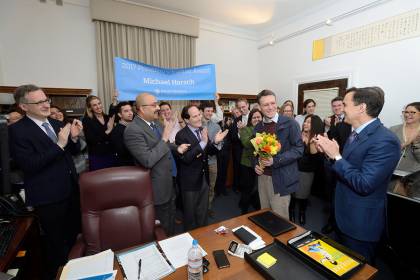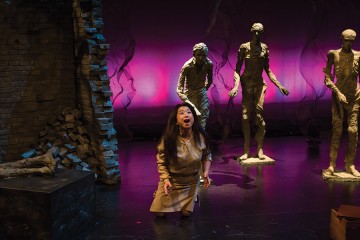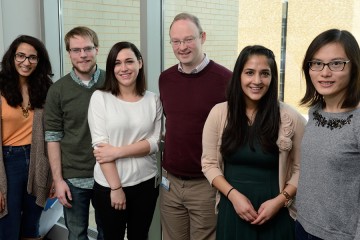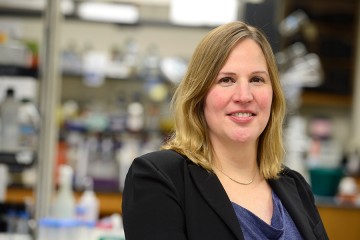Composer and pianist Michael Hersch says there are musical projects that have lived in his imagination for decades, but that he never expected to bring to life.
Today, Johns Hopkins University President Ronald J. Daniels and Provost Sunil Kumar presented Hersch, who leads the Peabody Institute's Composition Department, with the $250,000 President's Frontier Award to help him share those ideas with the world.
"His peers and the press describe Michael as one of the most prominent composers in the country, an uncommon talent, and a unique voice in American music," said Daniels, who was joined by administrators, faculty, and students to surprise Hersch with the announcement on the Peabody campus this morning. "A pianist, as well as composer, Michael challenges listeners and performers alike with works of great complexity, audacity, and empathy. The provost and I are excited to recognize Michael as he nurtures his impressive talent and continues to increase his stature in the classical music world".
Said Hersch: "This will be transformative in the sense that I will be able to do things that were just simply not conceivable without the kind of support that this will allow."
Hersch has built a significant international reputation as major orchestras, chamber ensembles, and soloists around the world have commissioned and performed his works. The Washington Post called him "a natural musical genius who continues to surpass himself … dark, brooding, and charged with an unrelenting and unforgettable intensity," and Baltimore Symphony Orchestra Music Director Marin Alsop told the St. Louis Post Dispatch that he is "a prodigy of immense proportions."
Currently, he teaches a studio of 20 composition students at Peabody and chairs the composition department there while writing new music, performing, and recording.
He is a Peabody alum who received a number of notable composition awards before the age of 30, including first prize in the Concordia American Composers Awards, the Guggenheim Fellowship in Music Composition, the Charles Ives Fellowship from the American Academy of Arts and Letters, and the Berlin and Rome prizes.
Among his recent projects, his first opera, On the Threshold of Winter, will be performed in several U.S. cities this year and released as a film in the fall. That piece uses text from Romanian poet Marin Sorescu's book-length poem "The Bridge"—written during the author's final two months of living with cancer—with an eight-piece ensemble and one soprano singer. Hersch also has a commission premiering with the Orpheus Chamber Orchestra at New York's Carnegie Hall in February, and additional premieres planned this year in the Netherlands, Berlin, and Vienna.

Image caption: Michael Hersch receives the President's Frontier Award in 2017
Image credit: Will Kirk / Homewood Photography
"There's an amazing integrity in his music," said Peabody Dean Fred Bronstein. "It's easy for composers to be influenced by a lot of different things, and all composers are, but there's a unique voice there in Michael, and he's never guided by what people are necessarily going to think about the music. He's guided by what he feels he needs to say as an artist."
Hersch said the award will allow him the freedom to focus on composing music and preparing it for performance. In particular, he said he is interested in exploring the intersection of music composition with other expressive art forms, and he wants to support the extensive time and energy required to perform larger works.
He also said that focusing such a substantial award on the arts this year "signifies an important cultural moment for an institution that has such an international reputation for medicine, the sciences, engineering, political discourse. … In this moment in our culture where all the arts are struggling and suffering, it is such a powerful message to other great institutions to take the creative and cultural power this country has and be proud of it, and support it, and allow it to flourish."
The Frontier Award was created with a donation from university trustee Louis J. Forster and alumna Kathleen M. Pike. The award recognizes one faculty member each year for five years, focusing on those who are poised to break new ground and be leaders in their fields. Previous recipients are Sharon Gerecht, an associate professor in the Department of Chemical and Biomolecular Engineering in the Whiting School of Engineering; and Scott Bailey, an associate professor in the Bloomberg School of Public Health's Department of Biochemistry and Molecular Biology.
This year, finalist Xin Chen, an associate professor of biology in the Krieger School of Arts and Sciences, is also being recognized as an outstanding finalist with a presidential monetary gift of $50,000 to support her research and academic pursuits.
Posted in Arts+Culture, University News
Tagged philanthropy, music, michael hersch, president’s frontier award











